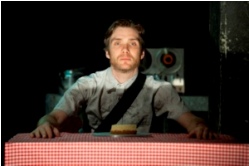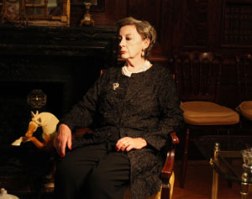Category: "Review"
Review: Close Up Sapce
Dec 23rd

David Hyde Pierce somehow always manages to project a vaguely uncomfortable, awkward quality in his characters. It feels totally appropriate for Close Up Space, the uncomfortable, awkward new comedy being presented by the Manhattan Theatre Club. This overly mannered play by Molly Smith Metzler squanders not only the talents of its leading man, but also such terrific supporting players as Rosie Perez and Michael Chernus and its talented director, Leigh Silverman (Well, Chinglish).
Hyde Pierce here plays a role that fits him like a glove: Paul, the widowed, high-strung head of a small but prestigious Manhattan publishing house. He’s the sort of exacting editor whose standards are so rigorous that he takes it upon himself to edit a letter--sent by the dean of the expensive private school his daughter attends—informing him that she’s just been kicked out.
Her malfeasances are not his only problems. His best-selling author (Perez) is deeply unhappy over Paul’s editing of her trashy tomes. And his homeless office manager (Chernus) has been reduced to camping out overnight in a tent in the middle of the office.
And when daughter Harper (Colby Minifie), finally does make an appearance, she insists on hurling both insults at him in Russian and the snowballs she’s brought along in her bag.
Balancing whimsy with emotion to little effect, the play barely makes any sense whatsoever. The central element—the relationship between father and daughter that has suffered due to his emotional withdrawal after his wife’s death—is handled in such silly absurdist fashion that it’s impossible to care about the outcome. And Hyde Pierce’s low-key charm is so potent that despite his character’s numerous faults, he remains entirely sympathetic, especially as compared to the bizarre creatures surrounding him.
Perez and Chernus occasionally manage to wrest some laughs from their poorly conceived roles, something that is clearly beyond Minifie. But as usual with this theater, there’s at least one redeeming element--Todd Rosenthal’s gorgeously detailed set, so warm and inviting that more than a few audience members will also be tempted to set up residence there.
New York City Center—Stage I, 131 W. 55th St. 212-581-1212. www.nycitycenter.org.
Review: Farm Boy
Dec 22nd

In what surely must be purely coincidental timing, Farm Boy has arrived for a holiday engagement at 59E59 Theaters. Michael Morpungo’s “sequel” to his War Horse has opened just as Steven Spielberg’s big-budget film adaptation hits theaters, and while the Lincoln Center production is still attracting record crowds. Unfortunately, this slight, two-character chamber piece registers less as a sequel than a footnote. Audiences expecting to see more of the equine hero Joey will be sorely disappointed.
Admittedly, this 65-minute one-act adapted and directed by Daniel Buckroyd which successfully toured the U.K. has its charms. Performed on a stage dominated by a rusty old life-sized tractor, it concerns an elderly farmer (John Walters) and his young grandson (Richard Pryal).
The grandfather, it turns out, is the son of Albert, the young man who figured so prominently in War Horse. After a perfunctory rehashing of the events of that earlier work, this play’s main plot element involves a plowing contest between Albert and Joey and a tractor, with the latter as the prize. That we’ve spent nearly an hour staring at the object in question leaves little doubt as to the outcome.
Otherwise, the homespun dialogue touches on such issues as the death years earlier of the grandfather’s wife and his never having learned to read or write. Underscoring the proceedings is a suitably gentle piano score composed by Matt Marks.
It’s all very innocuous, although it’s hard to tell who the show is geared for since it seems too elevated for children and too mild for adults. There’s no denying the heartfelt sincerity of the piece or the effectiveness of the performances, especially Walter’s physically fragile but talkative grandpa. But it’s hard not to miss Joey, who, let’s face it, is the heart and soul of War Horse.
59E59 Theaters, 59 E.59th St.212-279-4200. www.59e509.org.
Review: Misterman
Dec 20th

The cavernous St. Ann’s Warehouse provides the perfect theatrical environment for Misterman, Irish playwright Enda Walsh’s one-person play starring Cillian Murphy in his U.S. stage debut. The actor--best known on our shores for his intense turns in such hit films as The Dark Knight and Inception—delivers a nearly aerobic performance as he ricochets around the environs of the massive space which simultaneously evokes an abandoned factory and the messy recesses of his character’s disintegrating psyche.
First staged in 1999, this work by the author of such plays as Disco Pigs, Penelope and The Walworth Farce (all of which also received their American premieres at this venue) features Murphy as Thomas Magill, a religious fanatic who has made it his mission to bring divine salvation to the denizens of the town of Inishfree.
He has documented his efforts on a series of audio recordings, snippets of which are heard being emitted by the numerous tape recorders scattered around the junk-laden space. As Thomas delivers a stream-of-consciousness monologue that becomes increasingly disjointed and surreal, he provides the voices of several of the townspeople, who are not exactly receptive to his desperate exhortations. He also engages in a running dialogue with his “Mammy,” demonstrating that the crazy apple doesn’t fall far from the tree.
The stylized proceedings become increasingly tiresome over the play’s 80-minute running time, and viewers may at times be hard-pressed to figure out exactly what’s going on. But there’s no denying the virtuosity of Murphy’s fiercely visceral performance, the highlight of which is his solo depiction of a beating inflicted on Thomas that is a masterful display of physical acting.
Adding greatly to the overall impact are the stunning production elements, including Jamie Vartan’s awesomely detailed set that seems to reveal new facets with every glance, and the bravura sound design by Gregory Clarke that conjures everything from barking dogs to the bucolic sounds of a pastoral village.
But the main special effect is Murphy himself. When he directs his gaze—featuring those much-commented upon, piercing blue eyes—at the audience, the results are hypnotic. His character may indeed be crazy, but we would probably follow him anywhere.
St. Ann’s Warehouse, 38 Water St. Brooklyn, NYC. 718-254-8779. www.stannswarehouse.org.
Review: Elective Affinities
Dec 16th

Good luck scoring an invitation to the most exclusive social reception in town. It’s being held at the palatial and luxurious Fifth Avenue townhouse belonging to the very wealthy Mrs. Alice Hauptmann. There you will be treated to tea, finger sandwiches, and a healthy dose of the vitriol at the heart of this fiendishly funny dowager.
The event is not real, of course, but actually a very clever, site-specific theater piece (presented by Soho Rep, piece by piece productions and Rising Phoenix Repertory) and starring the legendary Zoe Caldwell. Written by David Adjmi (Stunning) and directed by Sarah Benson, Elective Affinities is an intriguing if ultimately slight piece--very slight, actually, since the play itself runs a mere 30 minutes or so. But this intimate experience, done for just thirty audience members an evening, offers the once-in-a-lifetime opportunity to experience a near-private performance by this great actress.
Upon entering the premises--the private location of which is sent to you a couple of days in advance via e-mail--one is greeted by an officious staff who check your coat and guide you to the upstairs drawing room. While a pianist plays classical music you can gaze at the enormous and horribly ugly abstract black sculpture that sits in the middle of the room.
Eventually you are personally welcomed by Mrs. Hauptmann herself, who just might greet you as if you’re an old friend and make such inquiries as whether or not your daughter has gotten into that university to which she was applying. You settle into another room, sitting on couches, chairs, divans, wherever you can, as your host proceeds to regale you with a rambling philosophical monologue in which she discusses subjects ranging from the Darwinian aspects of nature to the necessity of torturing terrorist suspects.
Chatty and convivial, she quickly reveals her true colors. “I love my husband, my friends,” she declares. “Other people, I’m indifferent to them. Until they harm me…or someone I love. Then I’m not indifferent. Then you can permit horrible things—torture, murder, genocide, that sort of thing.”
Clearly influenced by Wallace Shawn’s similarly monstrous character in Aunt Dan and Lemon, Mrs. Hauptman pales by comparison, and so does this brief playlet. But it’s nonetheless a haunting experience, not diminished at all by the fact that Caldwell performs with the script in front of her. Simply being in the intimate company of this theatrical giant is a privilege well worth paying for.
“Hauptmann Residence,” New York City. 212-352-3101.
Review: Lysistrata Jones
Dec 15th

The near demise of commercial off-Broadway has resulted in a plethora of unsuitable Broadway productions of tiny shows that look awfully wan in big theaters. The latest example is Lysistrata Jones, originally presented by the enterprising Transport Group on the basketball court of the Judson Memorial Church gymnasium. This musical updating of Aristophanes’ comedy—about a group of college cheerleaders who decide to withhold sex from their boyfriends on the perennially losing Athens University basketball team until they win a game—benefited mightily from its unique venue. On the stage of the Walter Kerr Theatre, it seems way out of its league.
Resembling a special-themed episode of Glee, the show--featuring a book by Douglas Carter Beane (responsible for such similarly silly musicals as Sister Act and Xanadu) and music and lyrics by Lewis Flinn--is more notable for the charged energy of its youthful ensemble than its creative elements. And it wears out its comedic welcome long before the conclusion of its two hour-plus running time.
Still, there’s some fun to be had, beginning with the outrageous presence of the big-bodied Liz Mikel as the show’s acerbic narrator. Beane’s book, gleaning most of its vulgar humor from the overcharged sex drives of both the male and female characters, has a suitably burlesque quality. And while the score boasts few memorable songs, such numbers as “Right Now” and the climactic “Give It Up!” display a raucous energy.
Director Dan Knechtges (Xanadu, The 25th Annual Putnam County Spelling Bee) keeps things moving at a suitably frantic pace, and his choreography, influenced by both cheerleading routines and basketball moves, is consistently inventive.
Among the ensemble, the standouts are Patti Murin, who provides just the right amount of perky sexiness as the title character; Jason Tam, very amusing as her unlikely, social media-obsessed love interest; and Josh Segarra, goofily endearing as the head jock.
The staging has been reconfigured for the Kerr’s proscenium stage, and some lavish props, such as a giant neon sign advertising a bordello, have been added to little effect. Most detrimentally, the sound has been jacked up to deafening levels, with the result that many of the lyrics are barely discernible.
In its former home, tix for Lysistrata Jones topped out at $60. On Broadway, they go up to $130, or $147 if you want aisle seats—and that’s not even counting the “premium” tickets, which are $199. Take a cue from the female characters in the show—don’t give it up.
Walter Kerr Theatre, 219 W. 48th St. 800-432-7250. www.Telecharge.com.